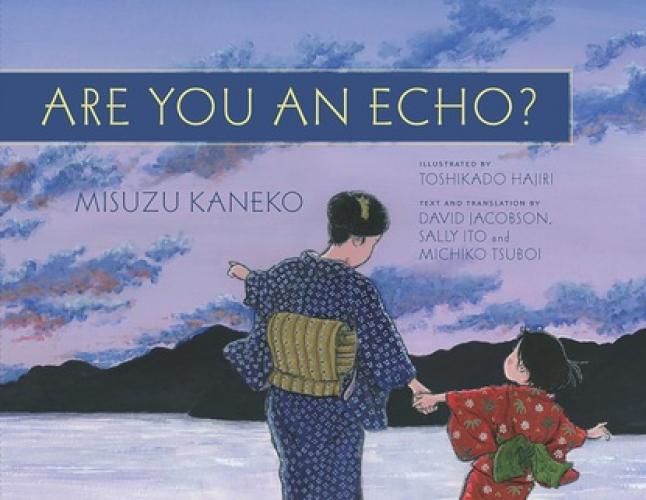foreword
It is such a great joy to know that Misuzu Kaneko’s poetry is being published by Chin Music Press and will reach North American readers. Misuzu Kaneko’s poems are part of every child’s curriculum at Japanese elementary schools. Her poems have been translated into eleven languages, and most of those editions were published overseas. It is my hope that Misuzu Kaneko’s words, which possess a deep kindness toward all things whether they are alive or inanimate, like rocks and soil, will touch the hearts of those who pick up this book. I dream that one day, when all of the world’s children grow up and set out on their journeys, that they do so with Misuzu Kaneko’s spirit in their hearts and her poems on their lips. I dream that that day will become a reality. I am deeply grateful to David Jacobson and the many others who have helped give shape to this book.
Setsuo Yazaki
Who was Misuzu Kaneko?
Setsuo Yazaki wanted to know. He read her poem “Big Catch” when he was a student, and was mesmerized.
Big Catch
At sunrise, glorious sunrise it’s a big catch!A big catch of sardines!
On the beach, it’s like a festivalbut in the sea, they will hold funeralsfor the tens of thousands dead.
Setsuo wondered: Who was this poet? She could understand the feelings of even the fish in the ocean!
Setsuo was especially curious because he was a poet himself. So he began to investigate, but he could find no trace of Misuzu. The bookstore where she wrote was gone. And when Tokyo was firebombed during World War II, the only copy of her poems anyone knew about was destroyed.
Setsuo spent sixteen years searching. He scoured old bookstores. He tried to find people who had known her. Finally, in 1982, Setsuo made a breakthrough. He tracked down Misuzu’s younger brother Masasuke, who was then seventy-seven years old.
Masasuke brought Setsuo a handful of photos and Misuzu’s three battered pocket diaries. Setsuo was astonished and delighted.
The diaries contained the only other set of the 512 poems Misuzu had written in her lifetime. Most of them had never been published. With Masasuke’s help, Setsuo was finally able to piece together who Misuzu really was.
Misuzu was born in 1903. She grew up in Senzaki, a fishing village in western Japan. She loved everything about it. Her beautiful hometown was perched on a narrow finger of land jutting into the Sea of Japan. From the shore, she could see glittering islands almost close enough to touch.
Benten Island
“Such a lovely island—seems a shame for it to be out there,so I’ll just snag it with a ropeand take it away.”
So laughed a sailor from the North.
He’s lying, he’s lying, I thought.But as night grew darker, I began to worry.
And in the morning, with my heart racingI ran to the beach.
Benten Island was still there floating on top of the waveswrapped in golden light,green as always.
Nearly all Japanese girls in the early 1900s stopped going to school after sixth grade. But Misuzu was different. She got to stay in school until she was seventeen. Misuzu’s mother thought reading and education were very important. She had managed a bookstore ever since Misuzu’s father died when Misuzu was three years old.
Misuzu was a thoughtful child, and she had many questions: What does it feel like to be snow? What good is dirt? Where do stars go in the daytime?
Wonder
I wonder whythe rain that falls from black clouds shines like silver.
I wonder whythe silkworm that eats green mulberry leaves is so white.
I wonder whythe moonflower that no one tends blooms on its own.
I wonder whyeveryone I askabout these thingslaughs and says, “That’s just how it is.”
Misuzu spent many happy hours in her mother’s bookstore. Her head was full of things she read in books and things she imagined. She liked having time to herself for inventing stories. Sometimes Misuzu had a hard time telling the difference between real life and what she read.
Beautiful Town
Suddenly, I recall that town—the red rooftops along the river bank;
and then, on the waters of that broad blue rivera white sail—quietly, quietly moving;
and on the grass of the riverbanka young man, an artistidly staring at the water.
And I? What was I doing?When I think I can’t remember,I realize it was all a picture in a borrowed book.
To Misuzu, everything was alive and had its own feelings—plants, rocks, even telephone poles! She felt the loneliness of whale calves orphaned after a hunt. She felt the nighttime chill of cicadas who had shed their old shells. And she felt the tearful sadness of a flower wet with dew.
She even felt bad for the fish on her plate:
Fish
I feel sorry for the fish in the sea.
Rice is grown by people,cows are raised on pastures, even carp are fed in their ponds.
But the fish in the sea—no one looks after them;they do no harm.And yet, here I am about to eat one.
I feel so sorry for the fish in the sea.
